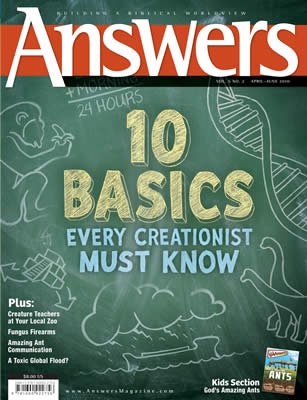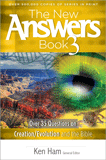Not Ashamed of a Biblical Starting Point
“Be diligent to present yourself approved to God, a worker who does not need to be ashamed, rightly dividing the word of truth.” 2 Timothy 2:15
A well-known atheist in the USA was interviewing me in my office concerning the creation/evolution issue and the book of Genesis. The conversation went something like this:
“So you admit that you start with the Bible?” she said to me.
“Yes, of course,” I replied.
“And you are not prepared to change anything the Bible states, are you?” she asked.
“No,” I said. “The Bible’s statements concerning creation, the Flood, and so on are not subject to change—God’s Word cannot be altered.”
“Ah,” she then responded, “that’s why creationists like you can never be real scientists. You see, real scientists like myself start with evidence and develop our theories. Then, as new evidence comes along, we modify our theories accordingly. You start with the Bible, not evidence, and you are not prepared to change your views. I start with evidence and am prepared to change or modify theories as new evidence comes along. That is real science.”
I then responded by asking, “You are an atheist, correct?”
“Yes,” she responded.
“And you don’t believe in God, and don’t believe the Bible’s account of Genesis has any part in science and in discussing the origins issue—is that right?”
“Yes,” she again responded.
“Are you prepared to change that?” I asked.
Now I can’t prove it because I didn’t have a video camera running at the time, but I believe I saw a slight smile on her lips as she ignored the challenge and went on asking more questions. You see, I believe this atheist realized that I had caught her—that she started with beliefs that she was not prepared to change. And those beliefs determined how she approached evidence in regards to the origins issue.
I was making the point that no one ever starts with just evidence. We all have presuppositions that determine how we approach evidence. Now when we discuss the topic of origins particularly, we are dealing with history—what happened to bring the universe and life on this earth into being. The big problem is that no human being was a witness to record what happened. All the evidence that humans have access to exists in the present.
Assumptions with the Evidence
When we are dealing with the issue of origins, we are trying to answer questions such as
- How did the universe come into existence?
- What happened to form the stars?
- How did life come about on earth?
- How did humans come into existence?
- What processes formed the fossil record?
Forensic scientists know only too well the limitations of working with evidence in the present to reconstruct the history of the past. For instance, quite a number of people have been convicted of a crime based on circumstantial evidence, only to be declared not guilty later when new evidence (such as DNA) came along to disprove the initial interpretation.
You may have experienced a similar situation in a murder mystery such as a book or television program about Sherlock Holmes or some other famous detective. It can go like this:
Halfway through, you are convinced the butler is guilty.
Three quarters of the way through, you are still convinced by the circumstantial evidence the butler did it.
Close to the end of the book or television program, the circumstantial evidence still points to the butler’s guilt.
Then, just before the end, a piece of information is revealed that totally changes your conclusions. You suddenly realize the butler is innocent and a person you didn’t expect is guilty!
As I often say after reading such a book or watching such a program, “That was a waste of time!”
The problem is that fallible humans, who don’t know everything, who weren’t present everywhere in the past, can come to totally wrong conclusions in trying to reconstruct the past. You can never know you have all relevant evidence. One piece of evidence can totally change one’s conclusions.
Only Two Starting Points
When visitors enter the Creation Museum in the Cincinnati area, one of the first exhibits they enter is called the Starting Points room.
In this teaching exhibit, people are taught to understand that everyone has basic starting beliefs, or “presuppositions,” which form their worldview (the way of thinking that they use to understand reality).
Ultimately, there are only two starting points:
- There is someone who knows everything about everything, who has always been there, who never tells a lie, and who reveals to us the information we need to know to come to right conclusions about this universe.
- Somehow, fallible man, who doesn’t know everything, who hasn’t always been there, who doesn’t always tell the truth, has to figure out the universe.
The only place we find a claim about someone who fits the first description is the Bible:
“Even from everlasting to everlasting, you are God” (Psalm 90:2).
“The Lord’s understanding is infinite” (Psalm 147:5).
“God cannot lie” (Titus 1:2).
The Bible not only claims to be a revelation from the infinite Creator but it gives a very detailed history concerning origins, to enable us to come to right conclusions. No other book does this. If this book is what it claims to be, then we have a revelation from an omnipotent God, who gives us the history we need to know so we can interpret the evidence of the present correctly.
If the Bible is really what it claims to be, a revelation from an omnipotent Creator, then the history that is revealed to us will make sense of the evidence of the present, and observational science should confirm this history—and it does!
For instance, the Bible gives us an account of the origin of space, time, matter, earth, dry land, water, plants, stars, sun, moon, sea creatures, flying creatures, land animals, humans, marriage, the seven-day week, clothing, sin, death, languages, nations, and much more! We learn about the Tower of Babel and the global Flood of Noah’s day. No evolutionist book covers all these topics. No other book does this, not the Koran or any Hindu book. Only the Bible gives such a detailed account of history.
If the Bible is really what it claims to be, a revelation from an omnipotent Creator, then the history that is revealed to us will make sense of the evidence of the present, and observational (empirical) science should confirm this history—and it does!
- The design in living things confirms an incredible intelligence behind the universe.
- The six-day Creation Week (and one day of rest) makes sense of the seven-day week we all adhere to.
- The giving of clothes after Adam and Eve sinned makes sense of why we wear clothes.
- Adam’s original sin and its consequence explain why we all die.
- The Flood of Noah’s day makes sense of most of the fossil record over the earth.
- The Tower of Babel makes sense of the different languages and nations, and yet genetics confirms we are all one race—consistent with humans being descendants of Adam and Eve.
The difference between me and the atheist who was interviewing me was that I have built my worldview on the biblical revelation, whereas she has built her worldview on her atheistic beliefs. We both approach the same evidence differently because we have different starting points.
Where Did We Go Wrong?
Sadly, most Christians have been educated in a secular education system that indoctrinates them to believe that humans start with evidence to determine beliefs about the past. That is simply not true! Everyone starts with certain beliefs that determine how the evidence is interpreted, even though most people have not consciously thought about what their starting beliefs are.
Because Christians have been indoctrinated in a secular system, they don’t know how to approach answering questions about dinosaurs, the age of the earth, and so on. By and large, they don’t realize that the secularists who taught them start with presuppositions that disallow the Bible’s revelation.
These Christians, who may be real born-again Christians, are secularized in their thinking. So, they ask questions like “How do you fit dinosaurs into the Bible?” Well, you really don’t! When we understand the right way to think as a Christian, we know that we should start with the Bible (the revelation from our infinite Creator) and build our thinking (worldview) upon that. Then we have the right way to look at the evidence of the present.
The Bible’s account of the creation of land animals, their diet before the Fall, the Flood of Noah’s day, and so on give us the right foundation to approach the topic of dinosaurs.
Now don’t misunderstand me here. The Bible is not a scientific textbook, per se. The word science basically means “knowledge.” Observational science, based on repeatable tests, is what builds technology. However, historical science (knowledge concerning the past to explain the present) is based on beliefs concerning history. The Bible is primarily a history book—an account of historical science, if you like—to enable us to think correctly concerning the origin of the universe, the meaning of life, the dilemma of sin, and the solution in Jesus Christ.
A number of qualified scientists are not ashamed to stand before this world and boldly proclaim that their starting point is the Bible. Among them are scientists at the Answers in Genesis ministry and Creation Museum. As you read various articles by these godly people, you will see over and over again how observational science confirms that the Bible really is the right starting point and reveals the inconsistency of starting with secular ideas.
Why is this ultimately important? If the history in the Bible concerning our origins were not true, then we would have no reason to trust the gospel message, which is based in that history. And the gospel is the heart of what Christians, such as those at Answers in Genesis, do—bring the saving message of the gospel to a fallen world so that people may be convicted of their sin and repent and be saved for eternity.
“If you confess with your mouth the Lord Jesus and believe in your heart that God has raised Him from the dead, you will be saved” (Romans 10:9).
Answers Magazine
April – June 2010
Debates about evolution and attacks on Scripture seem endless. But why should we be ashamed of truth? In this issue you’ll find basic truths revealed in Genesis and confirmed by science—bare-bones essentials that all Christians need. Also look for fascinating science news, ideas for a faith-building creation “stay-cation” to your local zoo, and semi-technical articles to strengthen your faith and challenge your mind!
Browse IssueRecommended Resources

Answers in Genesis is an apologetics ministry, dedicated to helping Christians defend their faith and proclaim the good news of Jesus Christ.
- Customer Service 800.778.3390
- Available Monday–Friday | 9 AM–5 PM ET
- © 2026 Answers in Genesis





